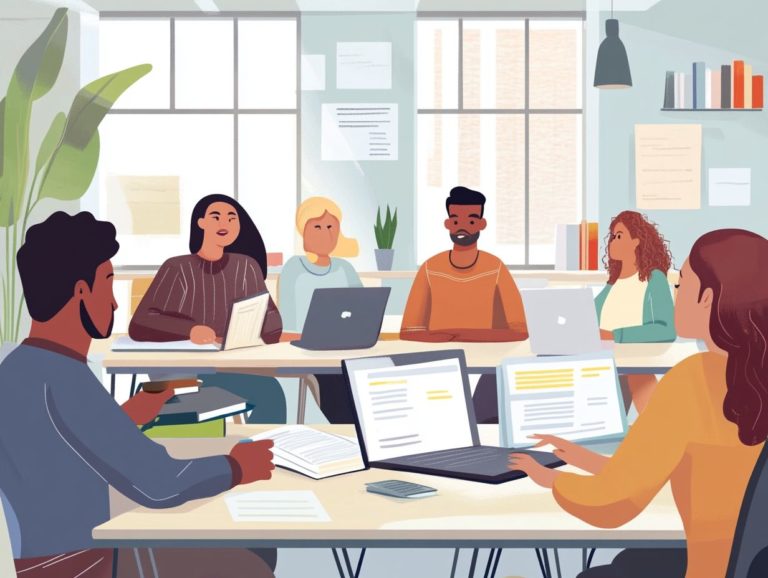How to Develop Effective Study Habits
Good study habits serve as the foundation of your academic success, influencing not only your grades but also your overall learning experience.
Dive into this article to discover the essential components of effective studying. Learn how to identify your unique learning style and craft a personalized study schedule.
You ll uncover proven techniques to enhance information retention, sustain your motivation, overcome distractions, and seek assistance when necessary.
Whether you re a student striving to elevate your grades or a lifelong learner, mastering these habits can truly transform your approach to studying.
Contents
Key Takeaways:
- Good study habits are crucial for academic success.
- Identifying your learning style helps tailor your study methods.
- A structured schedule keeps you organized and focused.

The Importance of Good Study Habits
Good study habits are key to your academic success. They help you navigate the challenges of higher education with confidence.
Effective strategies can boost your grades and enhance your personal growth, paving the way for a fulfilling educational experience.
Recognizing that your study methods influence not only your performance but also your mental health and personal development is crucial.
By adopting a growth mindset and positive thinking, you can take charge of your educational journey and meet your course expectations with confidence.
Why Study Habits Matter for Academic Success
Study habits are essential for your academic success. They enable you to learn smarter and achieve your educational goals with remarkable efficiency.
Embracing effective learning strategies and self-directed learning can significantly enhance your academic performance. This creates personalized learning experiences tailored to your needs and fosters independence and critical thinking.
The synergy between strong study habits and time management skills is vital. Planning and structuring your study sessions maximizes productivity and minimizes procrastination, leading to better information retention.
Cultivating a disciplined routine supports your learning journey and helps you achieve the academic outcomes you desire.
Identifying Your Learning Style

Knowing your learning style helps you create effective study strategies. This knowledge can make it easier to understand complex topics with greater ease and confidence.
Understanding How You Learn Best
Understanding how you learn best involves recognizing your preferred learning styles. Integrating study techniques that resonate with you significantly enhances your attention span and retention of information.
For instance, if you’re a visual learner, diagrams or color-coded notes can make the material more engaging and memorable.
Auditory learners often benefit from listening to explanations or discussing topics with peers to solidify their understanding.
If you thrive on physical interaction, hands-on activities may be your key to success.
Incorporating memory aids like flashcards caters to various learning styles, allowing you to revisit challenging concepts in a manageable way.
Ultimately, fostering self-awareness about your unique learning preferences is essential. It enables you to choose techniques that work best for you, leading to a personalized and productive study experience.
Creating a Study Schedule
A structured study schedule is vital for managing your time effectively. Allocate specific slots for studying, reviewing, and even relaxing.
This balanced approach maximizes your study time while ensuring you maintain your well-being.
Tips for Organizing Your Study Time

Organizing your study time effectively can greatly improve your learning and academic performance. Study smarter, not harder, while cutting down distractions.
Adopt a structured approach by prioritizing tasks based on deadlines and importance. Set specific, achievable goals for each study session to stay focused and feel accomplished.
Use digital calendars or time management apps to help you stay organized. They can remind you of deadlines and keep your schedule on track.
Create a distraction-free study environment. This means finding a quiet place, turning off notifications, and setting boundaries with others around you.
Effective Study Techniques
Employing effective study techniques is essential for retaining information and boosting your academic performance. These techniques help you navigate complex topics easily and make the most of your study materials.
Proven Methods for Retaining Information
Proven methods for retaining information include review sessions, memory aids, and study strategies that match how your brain works.
Spaced repetition is a powerful tool. By revisiting material at set intervals, you allow for deeper processing and significantly reduce forgetfulness.
Summarization is crucial; it encourages you to break down complex information into digestible chunks, making it easier to grasp. Incorporating visual aids like mind maps and diagrams makes learning more engaging and helps create strong mental links.
Regularly scheduling review sessions solidifies what you’ve learned. This transforms fleeting knowledge into lasting memories and deepens your understanding of the subject.
Maintaining Motivation and Focus

Maintaining motivation and focus is crucial for achieving academic excellence. Start cultivating positive thinking now to supercharge your motivation!
Strategies for Staying on Track
To keep yourself on track, set clear academic goals, use study groups, and sharpen your time management skills. These create a supportive learning environment.
Study groups serve as an accountability system, connecting you with peers who share similar goals and challenges. Collaborating lets you exchange valuable insights, deepening your understanding of complex subjects and refining effective study techniques.
The energy of collective motivation inspires group members to uplift each other, turning mundane study sessions into dynamic discussions.
Integrating time management skills is essential. Prioritizing tasks helps you stay focused on your objectives, ensuring you meet deadlines and maintain a balanced approach to your studies.
Overcoming Common Study Challenges
Overcoming common study challenges like procrastination and distractions is essential for your academic success. You need effective strategies to manage your time wisely and enhance your focus during study sessions.
Dealing with Distractions and Procrastination
Dealing with distractions and procrastination requires you to use specific study techniques and create an environment that enhances your cognitive performance.
As a student, you may often find yourself veering off course due to various distractions like digital notifications buzzing, noisy surroundings, or a cluttered workspace. Recognizing these triggers is essential for maintaining productivity.
To counteract this, consider establishing a dedicated study zone that is clean and organized, eliminating clutter that leads to wandering thoughts.
Embracing techniques like the Pomodoro Technique a method where you study for 25 minutes and then take a 5-minute break can significantly bolster your concentration. Limiting access to distracting devices while you study can help as well.
Ultimately, being aware of your personal procrastination triggers will lay the groundwork for a more disciplined and effective study approach.
Seeking Help When Needed
Recognizing when to seek help is a crucial part of your learning journey.
Tapping into academic support and leveraging educational resources can greatly boost your understanding and make learning fun! Embracing this approach not only enriches your knowledge but also fosters a more confident and engaged learning experience.
Utilizing Resources and Support Systems
Utilizing resources and support systems effectively can enhance your learning experience and help you overcome academic hurdles through collaboration and shared knowledge.
Among these essential resources are tutoring services, which offer personalized assistance tailored to your unique learning needs and allow for a deeper understanding of complex subjects.
Mentorship programs also play a crucial role, providing guidance from experienced peers or professionals who can share invaluable insights and strategies for success.
You can now access tons of great online resources at your fingertips, ranging from educational videos to interactive platforms, making your learning journey more flexible and engaging.
Study buddies further enrich this supportive network; they provide motivation and accountability, reminding each other of deadlines and fostering consistent study habits, creating a more productive learning environment.
Frequently Asked Questions
What are effective study habits?
Effective study habits refer to the techniques and strategies a person uses to improve their learning and retention of information.
Why is it important to develop effective study habits?
Developing effective study habits can help you better understand and retain information, improve your grades, and reduce stress and anxiety related to studying.
What are some examples of effective study habits?
Examples of effective study habits include creating a study schedule, breaking up study sessions into manageable chunks, minimizing distractions, and using active learning techniques like summarization and self-testing.
How can I create a study schedule?
To create a study schedule, start by identifying your goals and priorities, then allocate specific time slots for studying each subject. Be sure to include breaks and stick to your schedule as much as possible.
How can I minimize distractions while studying?
To minimize distractions, choose a quiet and comfortable study space, turn off your phone or put it on silent mode, and avoid multitasking. Using noise-cancelling headphones or listening to instrumental music can also help you focus.
What should I do if I’m struggling to develop effective study habits?
If you’re struggling to develop effective study habits, consider seeking help from a teacher, tutor, or academic advisor. They can provide personalized tips and resources to help you improve your study habits and achieve academic success.
Start applying these strategies today and watch your productivity soar!






